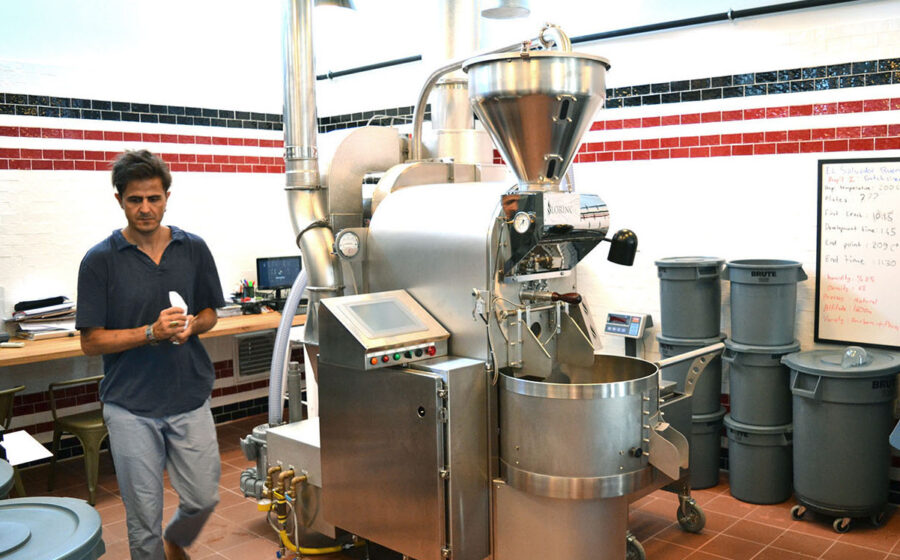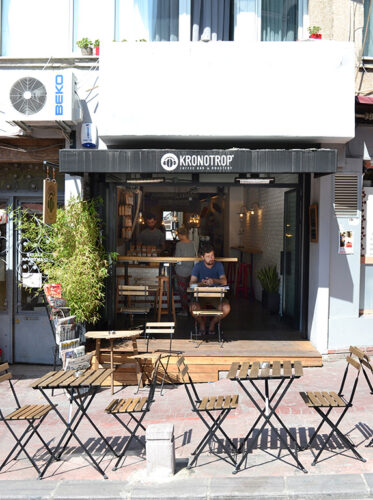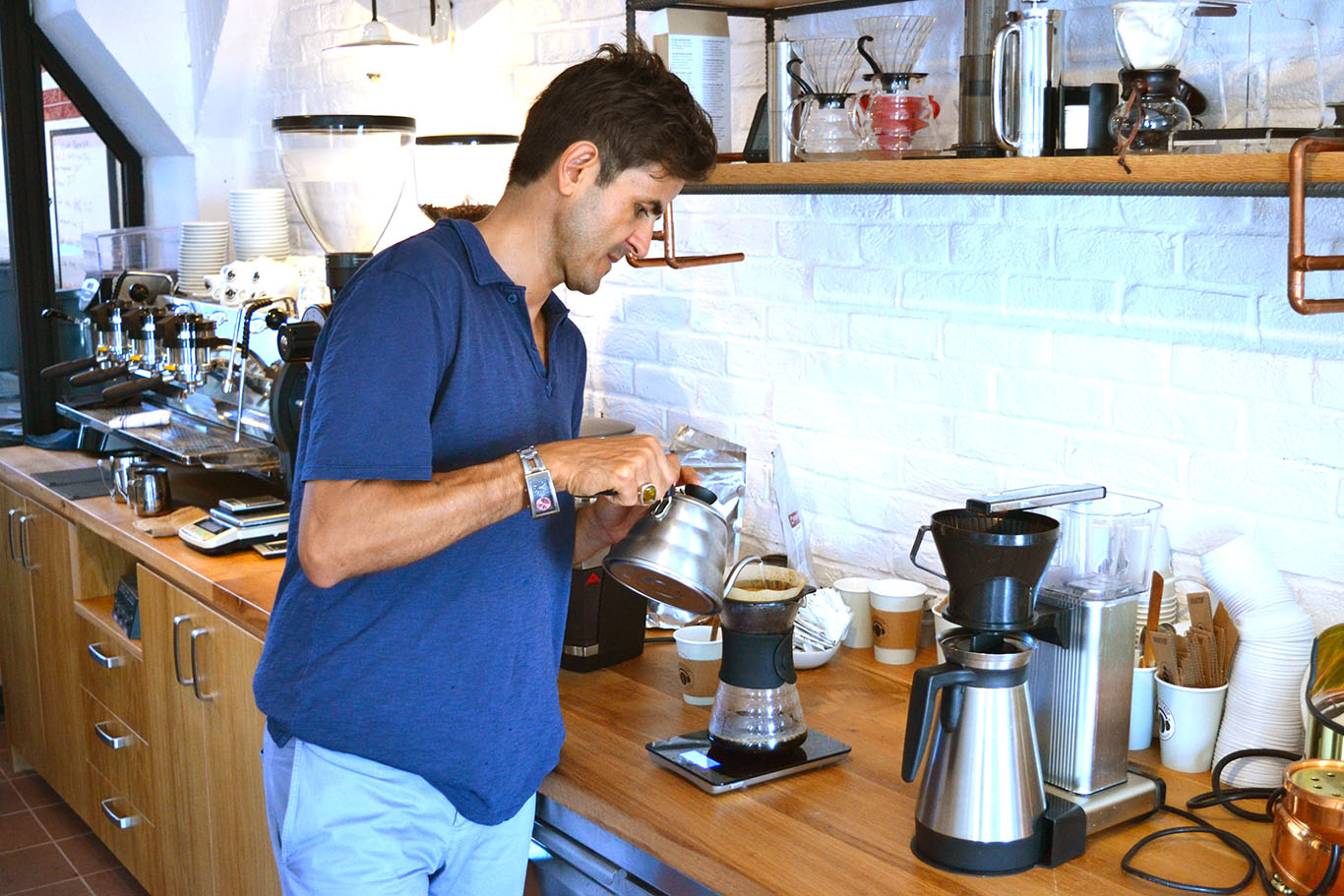[I]n Istanbul two years ago, one was hard pressed to find a shop serving a decent shot of espresso. Today, a new generation of Young Turks is interpreting the global craft coffee movement for one of the world’s largest cities. Leading the way is Kronotrop, a popular café in Cihangir, a trendy neighborhood on the European side that invites comparisons to Brooklyn. Though one might first notice the impressive array of equipment—La Marzocco Strada EP, Mahlkönig EK 43 grinder, Japanese-style cold-drip towers—what sets Kronotrop apart is what’s in the cup. Kronotrop, which means “a substance which alters one’s heart rate,” goes to great lengths to source and roast only the highest quality coffees, no small challenge considering Turkey’s strict importing laws.
At the center of Kronotrop’s high standards is the unwavering commitment of founder Çağatay Gülabioğlu. When Gülabioğlu started Kronotrop, he roasted all of the coffee in-house on a one-kilo Toper Cafemino. Although Gülabioğlu was limited by the green coffee he was able to source, his efforts caught the attention of Mehmet Gürs, one of Turkey’s foremost chefs and the founder of Istanbul Food and Beverage Group. Gürs and Gülabioğlu joined forces a little over a year ago, and now Kronotrop is roasting for all of the restaurants in the group, most notably Mikla, a Scandinavian-Turkish restaurants that tops Istanbul restaurant guides from publications like the New York Times and the Guardian. Gürs joins a growing number of world-class chefs who desire to provide a coffee experience on par with their food and wine. Gürs bemoans that at many fine-dining restaurants “the last thing you leave with is crap. Coffee has been left out of the experience.”
With the increased demand, Gülabioğlu recognized he needed to upgrade his roaster. Although Turkey is home to coffee roaster manufacturers such as Has Garanti, Öztürk, and Toper, Gülabioğlu’s meticulous research led him to import a Loring S15 Falcon. The California-made roaster carries a much higher price tag than other roasters, but offers digitally programmable roast profiles, a faster cooling system, and lower carbon emissions than the local brands. The increased fuel efficiency is an added bonus in Turkey, which is energy dependent on surrounding countries.
Kronotrop’s approach to roasting, like Gürs’ restaurant, is Scandinavian inspired. Companies such as Tim Wendelboe in Norway and The Coffee Collective in Denmark gave Gülabioğlu a preference for coffees roasted to first crack, but he recognizes the Nordic style is too light for Turkish palates. Instead, Gülabioğlu seeks to develop each coffee to optimal sweetness while preserving the enzymatic qualities unique to the bean. The switch to a convective roaster has been a steep learning curve for Gülabioğlu, but he is confident Kronotrop’s quality and consistency will improve with the technological capabilities of their new roaster.
To house the roaster, Gürs converted his former test kitchen in Atatürk Oto Sanayi into Kronotrop’s new roastery and training center. The industrial neighborhood lies near the northern extreme of Istanbul’s sprawling city limits, but the facility is conveniently located a short walk from a metro line. The stark white interior makes a distinct contrast with the surrounding body shops, but visitors will immediately notice the space mirrors the Cihangir café. The same red, white, and black tiles, handmade in Anatolia, surround the roaster. And the training room features the same Strada EP and Mazzer Robur combination for espresso. Perhaps the bags of green coffee, sourced in partnership with American importer Ninety Plus, mark the greatest difference between the two spaces.
The roastery is also home to Kronotrop’s current project: applying Gold Cup standards to Turkish coffee. Traditionally, Turkish coffee is made with finely ground coffee heated in a copper cevze. The slurry is poured into a Turkish coffee cup, where the sediment is allowed to sink to the bottom. Anyone who has ever attempted the method knows it’s difficult to master. It doesn’t help that most Turkish coffee is made with low-quality Brazilian commodity beans. To assist with the project Kronotrop has enlisted 2012 World Cevze Champion Turgay Yıldızlı, who splits his time between Istanbul and New Orleans. Yıldızlı uses a Mahlkönig EK 43 for even particle size and a VST refractometer to measure the resulting total dissolvable solids. Yıldızlı’s latest innovation is to pre-chill the Turkish coffee cup to reduce post-pour extraction, which often causes increased bitterness. In the coming months, Yıldızlı is partnering with Kronotrop to release his own signature line of cevze and coffee cups.
Despite enormous advances, Gülabioğlu’s focus is still on the future. “Our ultimate goal is to source our own coffee and to go to the farms.” With plans for expansion around Turkey in the works, Gülabioğlu’s dream may be in sight.
—Michael Butterworth is a barista who runs the Coffee Compass.

















